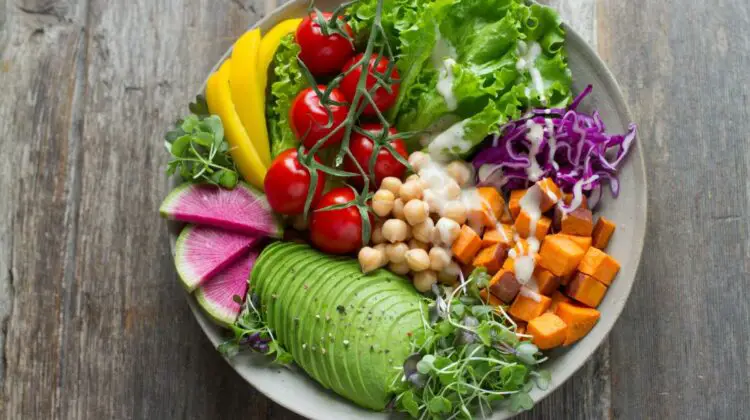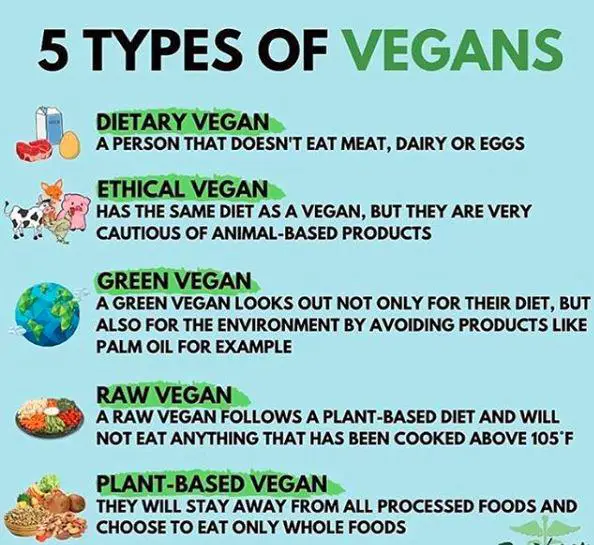
In recent years, the vegan diet has gained immense popularity, not only for its ethical and environmental considerations but also for its potential health benefits.
This comprehensive guide aims to provide you with all the essential information you need to know about the vegan diet – from its basic principles and benefits to potential challenges and practical tips for a successful transition.
What Is Vegan Diet?
As you embark on your journey into the world of veganism, it’s essential to keep an open mind and a willingness to learn and adapt. The vegan diet offers a plethora of health benefits, ethical considerations, and environmental advantages, but like any dietary change, it requires careful planning and understanding.
1. Definition of a Vegan Diet
- Key Principles: No Animal Products
- Types of Vegans: Whole-Food Plant-Based vs. Junk Food Vegans
2. Health Benefits of a Vegan Diet
- Nutrient-Rich Diet
- Reduced Risk of Chronic Diseases
- Weight Management and Improved Metabolism
- Enhanced Digestive Health
- Potential Anti-Inflammatory Effects
3. Getting Essential Nutrients
- Protein: Plant Sources for Adequate Intake
- Calcium: Non-Dairy Sources for Strong Bones
- Iron: Plant-Based Iron and Enhancing Absorption
- Vitamin B12: The Importance of Supplementation
- Omega-3 Fatty Acids: Incorporating Flaxseeds, Chia Seeds, and Walnuts
4. Planning a Balanced Vegan Diet
- The Vegan Food Pyramid
- Portion Control and Caloric Needs
- Incorporating a Variety of Foods
- Reading Food Labels for Hidden Animal Ingredients
5. Potential Challenges and Solutions
- Social and Dining Challenges
- Vitamin and Mineral Concerns
- Dealing with Cravings and Emotional Eating
- Finding Vegan-Friendly Products
6. Tips for a Successful Transition
- Gradual vs. Immediate Transition
- Educate Yourself About Nutrition
- Experiment with New Foods and Recipes
- Connect with the Vegan Community
7. Veganism and the Environment
- Impact of Animal Agriculture on the Planet
- Reducing Your Carbon Footprint Through Diet Choices
- Importance of Sustainable Food Practices
8. Vegan Diet for Different Life Stages
- Vegan Pregnancy and Child Nutrition
- Veganism for Athletes and Fitness Enthusiasts
- Senior Citizens and the Vegan Diet
9. Sample Vegan Meal Plan
- Breakfast, Lunch, Dinner, and Snack Ideas
- Balancing Macronutrients in Each Meal
- Hydration and Importance of Water
10. Addressing Common Myths
- Protein Deficiency in a Vegan Diet
- “Natural” vs. Plant-Based Supplements
- Taste and Satisfaction in Vegan Meals
What are the 4 types of vegan?

There are several types of vegan diets, each with its own variations and focuses. Here are some of the common types of vegan diets:
- Whole-Food Plant-Based (WFPB) Diet: This type of vegan diet emphasizes whole, minimally processed foods. It focuses on consuming foods in their natural state, such as fruits, vegetables, whole grains, legumes, nuts, and seeds. The goal is to prioritize nutrient-dense and fiber-rich foods while minimizing or avoiding processed foods, added sugars, and oils.
- Raw Vegan Diet: Raw vegans consume only raw and uncooked foods, primarily plant-based. This diet includes fruits, vegetables, nuts, seeds, and sprouted grains. Raw vegans believe that cooking foods can destroy their natural enzymes and nutrients. However, it’s important to note that cooking some foods can enhance their nutrient availability and digestibility.
- High-Carb Low-Fat (HCLF) Vegan Diet: This diet focuses on consuming a high percentage of calories from carbohydrates, primarily from whole plant foods like fruits, vegetables, and grains. Fat intake is minimized, often by avoiding overt fats like oils, nuts, and seeds. The HCLF approach is favored by some for weight loss and athletic performance.
- Plant-Based Whole Foods Diet: Similar to the WFPB diet, this approach emphasizes consuming plant-based foods in their whole forms, avoiding refined and heavily processed foods. It encourages a variety of colorful fruits, vegetables, whole grains, legumes, nuts, and seeds for optimal health.
You May Also Want To Know: Effective Sugar Free Diet List of Foods And Drinks
Other Types Of Vegan Diet
- Vegan Keto Diet: A vegan keto diet combines the principles of veganism with a ketogenic approach, which involves consuming very low carbohydrates, moderate protein, and high fat. Plant-based sources of fat, such as avocados, coconut oil, and nuts, are emphasized, while high-carb foods like grains and fruits are limited.
- Junk Food Vegan Diet: While not the healthiest option, some vegans consume a diet consisting largely of processed and convenience vegan foods, such as vegan burgers, pizzas, and sweets. While these foods may be free of animal products, they can still be high in calories, sugars, and unhealthy fats.
- Gluten-Free Vegan Diet: This diet avoids both animal products and gluten-containing grains like wheat, barley, and rye. It relies on gluten-free grains like rice, quinoa, and oats, along with vegetables, fruits, legumes, and nuts.
- Nutrient-Specific Vegan Diet: Some vegans may choose to follow diets focused on specific nutrients or health goals. For example, a high-iron vegan diet might include iron-rich plant foods like beans, lentils, and spinach. A high-protein vegan diet could focus on protein sources like tofu, tempeh, and seitan.
- Vegan Mediterranean Diet: Combining the principles of veganism with the Mediterranean diet, this approach focuses on plant-based foods, olive oil, nuts, seeds, whole grains, and plenty of fruits and vegetables. It aims to provide the health benefits associated with both diets.
Also Read: 40 Mouthwatering Vegan Recipes!
It’s important to choose a vegan diet that aligns with your health goals, preferences, and nutritional needs. Before making any significant dietary changes, consider consulting with a registered dietitian or healthcare professional to ensure you’re getting all the essential nutrients your body requires.
Embracing a vegan lifestyle is not only a dietary choice but also a conscious decision that can positively impact your health, the environment, and animal welfare.
By understanding the principles of the vegan diet, getting the right nutrients, planning balanced meals, and addressing challenges, you can embark on a fulfilling and sustainable vegan journey.
Remember, knowledge and preparation are key, and with the right approach, you can enjoy all the benefits that a vegan diet has to offer.
Things To Note-
- Remember that balance is key. While the vegan diet can be incredibly nutrient-rich, it’s important to make informed choices to ensure you’re meeting all your nutritional needs.
- Educate yourself about the various plant-based protein sources, calcium-rich foods, iron-absorption enhancers, and the importance of vitamin B12 supplementation. Being well-informed will empower you to create well-rounded and satisfying meals that support your health.
- When faced with challenges, such as social situations or dining out, remember that you’re not alone. Connect with the growing vegan community, both online and offline, for advice, recipes, and support. With time and practice, you’ll develop strategies to navigate these situations confidently.
- Additionally, consider the environmental impact of your dietary choices. By adopting a vegan diet, you’re contributing to the reduction of greenhouse gas emissions, water consumption, and deforestation associated with animal agriculture. Your food choices can make a significant difference in the global effort to mitigate climate change.
- Finally, experiment with new foods and recipes to keep your meals exciting and diverse. The vegan diet offers a wide range of plant-based ingredients that you might not have tried before. By exploring new flavors and cuisines, you’ll find that vegan meals can be delicious, satisfying, and deeply fulfilling.
Conclusion
In conclusion, the vegan diet is more than just a trend; it’s a conscious lifestyle choice that aligns with ethical, health, and environmental considerations.
Armed with the knowledge from this guide, you have the tools to embark on a successful and enriching vegan journey. Remember that every small step you take toward a plant-based lifestyle is a step toward a better world for yourself, the animals, and the planet we all call home.
So, whether you’re considering a vegan diet for ethical reasons, health benefits, or environmental concerns, the journey ahead is full of possibilities and discoveries. Embrace the change, enjoy the adventure, and relish the positive impact you’re making on your well-being and the world around you.

Leave a Reply
You must be logged in to post a comment.